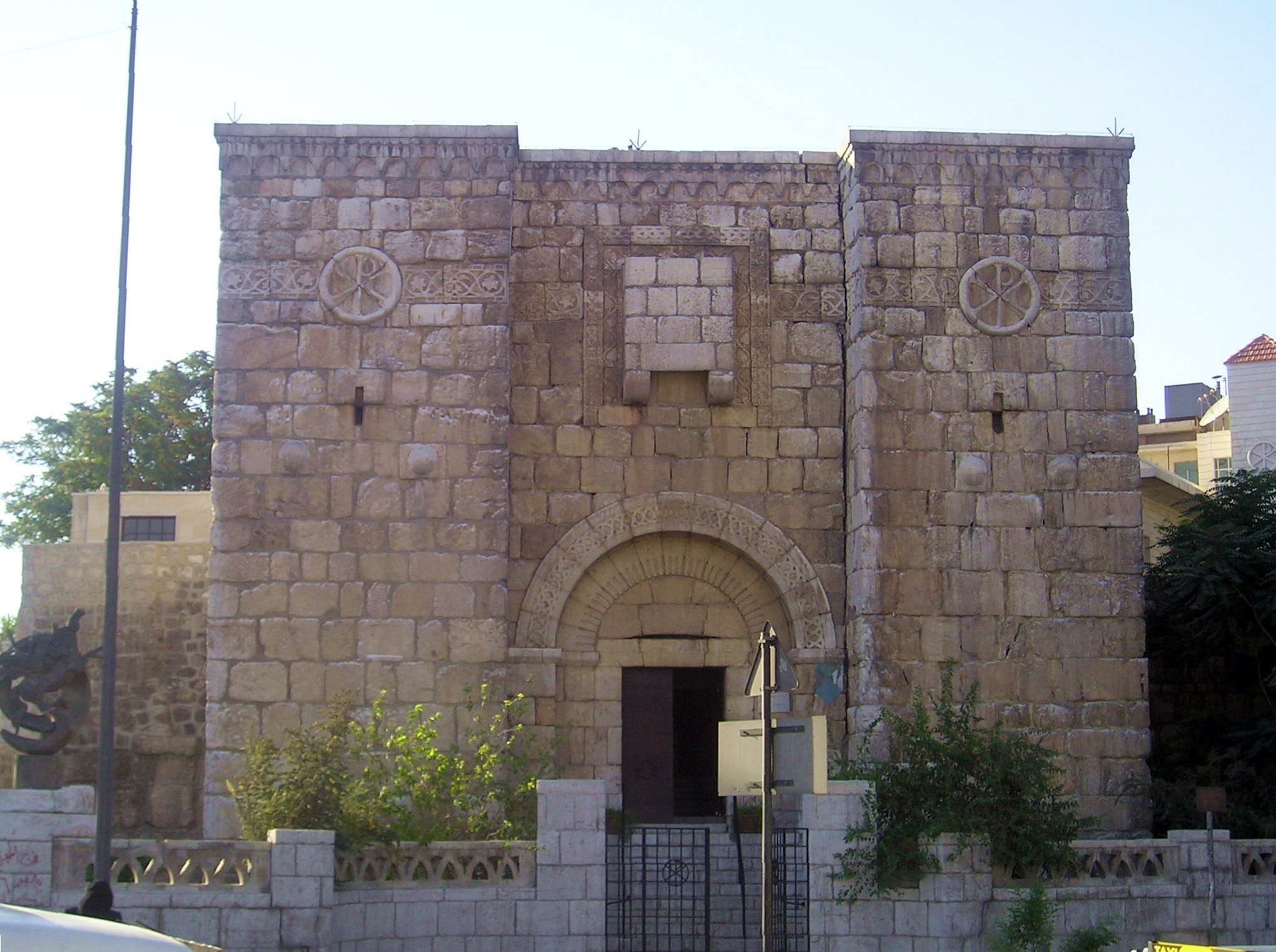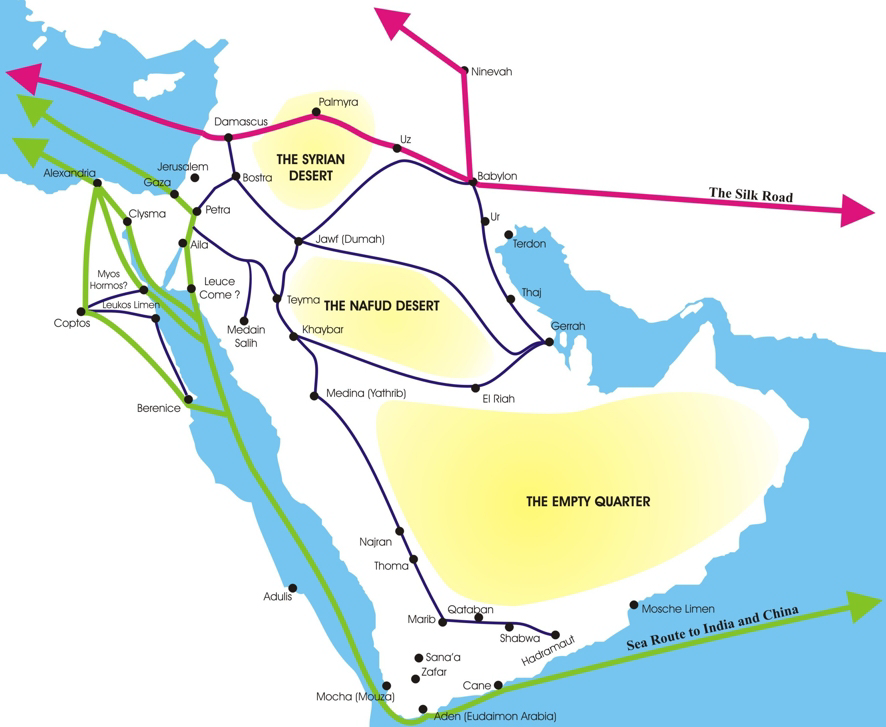|
Bab Kisan
Bab Kisan ( ar, بَابُ كِيسَانَ, Bāb Kīsān, meaning "Kisan Gate") is one of the seven ancient city-gates of Damascus, Syria. The gate, which is now located in the southeastern part of the Old City, was named in memory of a slave who became famous during a conquest by the Caliph Mu'awiya. The wall was built during the Roman era and was dedicated to Saturn. Bab Kisan may have been the escape route of St Paul. According to the Bible, Paul settled in Damascus after having claimed (''Acts 9:1–9'') to have witnessed a vision where Jesus was on a road to the city. After staying three years in Damascus, he went to live in the Nabataean kingdom (which he called "Arabia") for an unknown period, then came back to Damascus, which by this time was under Nabatean rule. After three more years (''Gal. 1:17;20''), he was forced to flee the city under the cover of night (Acts ''9:23;25; 2 Cor. 11:32ff'') after explosive reactions from Jews who opposed his teachings. He was lower ... [...More Info...] [...Related Items...] OR: [Wikipedia] [Google] [Baidu] |
Damascus
)), is an adjective which means "spacious". , motto = , image_flag = Flag of Damascus.svg , image_seal = Emblem of Damascus.svg , seal_type = Seal , map_caption = , pushpin_map = Syria#Mediterranean east#Arab world#Asia , pushpin_label_position = right , pushpin_mapsize = , pushpin_map_caption = Location of Damascus within Syria , pushpin_relief = 1 , coordinates = , subdivision_type = Country , subdivision_name = , subdivision_type1 = Governorate , subdivision_name1 = Damascus Governorate, Capital City , government_footnotes = , government_type = , leader_title = Governor , leader_name = Mohammad Tariq Kreishati , parts_type = Municipalities , parts = 16 , established_title = , established_date ... [...More Info...] [...Related Items...] OR: [Wikipedia] [Google] [Baidu] |
Syria
Syria ( ar, سُورِيَا or سُورِيَة, translit=Sūriyā), officially the Syrian Arab Republic ( ar, الجمهورية العربية السورية, al-Jumhūrīyah al-ʻArabīyah as-Sūrīyah), is a Western Asian country located in the Eastern Mediterranean and the Levant. It is a unitary republic that consists of 14 governorates (subdivisions), and is bordered by the Mediterranean Sea to the west, Turkey to the north, Iraq to the east and southeast, Jordan to the south, and Israel and Lebanon to the southwest. Cyprus lies to the west across the Mediterranean Sea. A country of fertile plains, high mountains, and deserts, Syria is home to diverse ethnic and religious groups, including the majority Syrian Arabs, Kurds, Turkmens, Assyrians, Armenians, Circassians, Albanians, and Greeks. Religious groups include Muslims, Christians, Alawites, Druze, and Yazidis. The capital and largest city of Syria is Damascus. Arabs are the largest ethnic group, and Mu ... [...More Info...] [...Related Items...] OR: [Wikipedia] [Google] [Baidu] |
Caliph
A caliphate or khilāfah ( ar, خِلَافَة, ) is an institution or public office under the leadership of an Islamic steward with the title of caliph (; ar, خَلِيفَة , ), a person considered a political-religious successor to the Islamic prophet Muhammad and a leader of the entire Muslim world (ummah). Historically, the caliphates were polities based on Islam which developed into multi-ethnic trans-national empires. During the medieval period, three major caliphates succeeded each other: the Rashidun Caliphate (632–661), the Umayyad Caliphate (661–750), and the Abbasid Caliphate (750–1258). In the fourth major caliphate, the Ottoman Caliphate, the rulers of the Ottoman Empire claimed caliphal authority from 1517. Throughout the history of Islam, a few other Muslim states, almost all hereditary monarchies such as the Mamluk Sultanate (Cairo) and Ayyubid Caliphate, have claimed to be caliphates. The first caliphate, the Rashidun Caliphate, was established in ... [...More Info...] [...Related Items...] OR: [Wikipedia] [Google] [Baidu] |
Mu'awiya
Mu'awiya I ( ar, معاوية بن أبي سفيان, Muʿāwiya ibn Abī Sufyān; –April 680) was the founder and first caliph of the Umayyad Caliphate, ruling from 661 until his death. He became caliph less than thirty years after the death of the Islamic prophet Muhammad and immediately after the four Rashidun Caliphate, Rashidun ('rightly-guided') caliphs. Unlike his predecessors, who had been close, early companions of Muhammad, Mu'awiya was a relatively late follower of the Islamic prophet. Mu'awiya and his father Abu Sufyan ibn Harb, Abu Sufyan had opposed Muhammad, their distant Qurayshite kinsman and later Mu'awiya's brother-in-law, until Muhammad conquest of Mecca, captured Mecca in 630. Afterward, Mu'awiya became one of Muhammad's katib, scribes. He was appointed by Caliph Abu Bakr () as a deputy commander in the Muslim conquest of the Levant, conquest of Syria. He moved up the ranks through Umar's caliphate () until becoming governor of Bilad al-Sham, Syria during ... [...More Info...] [...Related Items...] OR: [Wikipedia] [Google] [Baidu] |
Saturn (mythology)
Saturn ( la, Sāturnus ) was a god in ancient Roman religion, and a character in Roman mythology. He was described as a god of time, generation, dissolution, abundance, wealth, agriculture, periodic renewal and liberation. Saturn's mythological reign was depicted as a Golden Age of abundance and peace. After the Roman conquest of Greece, he was conflated with the Greek Titan Cronus. Saturn's consort was his sister Ops, with whom he fathered Jupiter, Neptune, Pluto, Juno, Ceres and Vesta. Saturn was especially celebrated during the festival of Saturnalia each December, perhaps the most famous of the Roman festivals, a time of feasting, role reversals, free speech, gift-giving and revelry. The Temple of Saturn in the Forum Romanum, Roman Forum housed the state treasury and archives (''aerarium'') of the Roman Republic and the early Roman Empire. The planet Saturn and the day of the week Saturday are both named after and were associated with him. Mythology The Roman land preserv ... [...More Info...] [...Related Items...] OR: [Wikipedia] [Google] [Baidu] |
Paul Of Tarsus
Paul; grc, Παῦλος, translit=Paulos; cop, ⲡⲁⲩⲗⲟⲥ; hbo, פאולוס השליח (previously called Saul of Tarsus;; ar, بولس الطرسوسي; grc, Σαῦλος Ταρσεύς, Saũlos Tarseús; tr, Tarsuslu Pavlus; la, Paulus Tarsensis AD), commonly known as Paul the Apostle and Saint Paul, was a Christian apostle who spread the teachings of Jesus in the first-century world. Generally regarded as one of the most important figures of the Apostolic Age, he founded several Christian communities in Asia Minor and Europe from the mid-40s to the mid-50s AD. According to the New Testament book Acts of the Apostles, Paul was a Pharisee. He participated in the persecution of early disciples of Jesus, possibly Hellenised diaspora Jews converted to Christianity, in the area of Jerusalem, prior to his conversion. Some time after having approved of the execution of Stephen, Paul was traveling on the road to Damascus so that he might find any Christians ... [...More Info...] [...Related Items...] OR: [Wikipedia] [Google] [Baidu] |
Jesus
Jesus, likely from he, יֵשׁוּעַ, translit=Yēšūaʿ, label=Hebrew/Aramaic ( AD 30 or 33), also referred to as Jesus Christ or Jesus of Nazareth (among other names and titles), was a first-century Jewish preacher and religious leader; he is the central figure of Christianity, the world's largest religion. Most Christians believe he is the incarnation of God the Son and the awaited Messiah (the Christ) prophesied in the Hebrew Bible. Virtually all modern scholars of antiquity agree that Jesus existed historically. Research into the historical Jesus has yielded some uncertainty on the historical reliability of the Gospels and on how closely the Jesus portrayed in the New Testament reflects the historical Jesus, as the only detailed records of Jesus' life are contained in the Gospels. Jesus was a Galilean Jew who was circumcised, was baptized by John the Baptist, began his own ministry and was often referred to as "rabbi". Jesus debated with fellow Jews on ho ... [...More Info...] [...Related Items...] OR: [Wikipedia] [Google] [Baidu] |
Nabataean Kingdom
The Nabataean Kingdom (Nabataean Aramaic: 𐢕𐢃𐢋𐢈 ''Nabāṭū''), also named Nabatea (), was a political state of the Arab Nabataeans during classical antiquity. The Nabataean Kingdom controlled many of the trade routes of the region, amassing large wealth and drawing the envy of its neighbors. It stretched south along the Red Sea coast into the Hejaz, up as far north as Damascus, which it controlled for a short period (85–71 BC). Nabataea remained an independent political entity from the mid-3rd century BC until it was annexed in AD 106 by the Roman Empire, which renamed it Arabia Petraea. History Nabataeans The Nabataeans were one among several nomadic Bedouin tribes that roamed the Arabian Desert and moved with their herds to wherever they could find pasture and water. They became familiar with their area as seasons passed, and they struggled to survive during bad years when seasonal rainfall diminished. Although the Nabataeans were initially embedded in Aramaic ... [...More Info...] [...Related Items...] OR: [Wikipedia] [Google] [Baidu] |
Arabia
The Arabian Peninsula, (; ar, شِبْهُ الْجَزِيرَةِ الْعَرَبِيَّة, , "Arabian Peninsula" or , , "Island of the Arabs") or Arabia, is a peninsula of Western Asia, situated northeast of Africa on the Arabian Plate. At , the Arabian Peninsula is the largest peninsula in the world. Geographically, the Arabian Peninsula includes Bahrain, Kuwait, Oman, Qatar, Saudi Arabia, the United Arab Emirates (UAE), and Yemen, as well as the southern portions of Iraq and Jordan. The largest of these is Saudi Arabia. In the classical era, the southern portions of modern-day Syria, Jordan, and the Sinai Peninsula were also considered parts of Arabia (see Arabia Petraea). The Arabian Peninsula formed as a result of the rifting of the Red Sea between 56 and 23 million years ago, and is bordered by the Red Sea to the west and southwest, the Persian Gulf and the Gulf of Oman to the northeast, the Levant and Mesopotamia to the north and the Arabian Sea and the Indian Oce ... [...More Info...] [...Related Items...] OR: [Wikipedia] [Google] [Baidu] |
Paul Of Tarsus And Judaism
Paul may refer to: *Paul (given name), a given name (includes a list of people with that name) * Paul (surname), a list of people People Christianity *Paul the Apostle (AD c.5–c.64/65), also known as Saul of Tarsus or Saint Paul, early Christian missionary and writer *Pope Paul (other), multiple Popes of the Roman Catholic Church *Saint Paul (other), multiple other people and locations named "Saint Paul" Roman and Byzantine empire *Lucius Aemilius Paullus Macedonicus (c. 229 BC – 160 BC), Roman general *Julius Paulus Prudentissimus (), Roman jurist *Paulus Catena (died 362), Roman notary *Paulus Alexandrinus (4th century), Hellenistic astrologer *Paul of Aegina or Paulus Aegineta (625–690), Greek surgeon Royals *Paul I of Russia (1754–1801), Tsar of Russia * Paul of Greece (1901–1964), King of Greece Other people *Paul the Deacon or Paulus Diaconus (c. 720 – c. 799), Italian Benedictine monk *Paul (father of Maurice), the father of Maurice, Byz ... [...More Info...] [...Related Items...] OR: [Wikipedia] [Google] [Baidu] |
Disciple (Christianity)
In Christianity, disciple primarily refers to a dedicated follower of Jesus. This term is found in the New Testament only in the Gospels and Acts. In the ancient world, a disciple is a follower or adherent of a teacher. Discipleship is not the same as being a student in the modern sense. A disciple in the ancient biblical world actively imitated both the life and teaching of the master. It was a deliberate apprenticeship which made the fully formed disciple a living copy of the master. The New Testament records many followers of Jesus during his ministry. Some disciples were given a mission, such as the Little Commission, the commission of the seventy in Luke's Gospel, the Great Commission after the resurrection of Jesus, or the conversion of Paul, making them '' apostles'', charged with proclaiming the gospel (the Good News) to the world. Jesus emphasised that being his disciples would be costly. Background of the term The term "disciple" represents the Koine Greek word ( ... [...More Info...] [...Related Items...] OR: [Wikipedia] [Google] [Baidu] |



.jpg)

.png)
